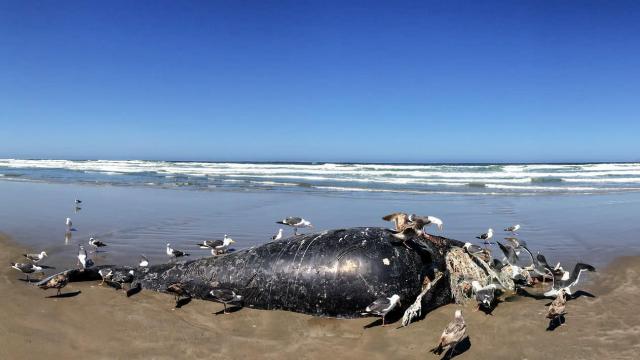Grey whales seem to strand themselves more often during solar storms, according to a new study.
Researchers still don’t know exactly how whales navigate the ocean’s dark depths during their epic migrations, and it’s difficult to study them in action. But recently, scientists discovered that sperm whale strandings in Europe’s North Sea seemed to correlate with the same solar storms responsible for the Northern Lights. Another team, based at Duke University and Adler Planetarium in Chicago, found a similar effect, shedding light both on how these whales move around and how conservationists might save them from mass beaching events in the future.
“We think that [solar activity] is turning off their ability to sense the Earth’s magnetic field,” Jesse Granger, Ph.D student in biology at Duke University, told Gizmodo. Imagine whales navigating using GPS: It’s as if the Sun is turning off the GPS in the middle of the trip.
Scientists have recorded whale strandings for decades, and, in many cases, the whales appeared to be otherwise healthy, the researchers wrote in the correspondence published today in Current Biology. If the whales were in good health when they accidentally beached, it’s possible that navigational issues were to blame. Building on past research linking beachings with sunspots, they studied 31 years of grey whale stranding data from the National Oceanic Atmospheric Administration and compared it to sunspot data, as well as to data on radiofrequency (RF) noise induced by solar activity and the Ap-index, a measurement of changes to the Earth’s magnetic field. Rounding up decades of disparate solar data was no easy feat, and astronomer Lucianne Walkowicz at the Adler Planetarium helped the researchers combine everything into a useful format.
The team chose the grey whale for their research due to its epic migration. Grey whales undertake one of the longest mammalian migrations; scientists have recorded one grey whale who covered 22,000 kilometres in six months, for example.
The researchers found that whales were 2.3 times more likely to beach on days with lots of sunspots, darker areas on the Sun caused by magnetic activity and associated with solar storms. The whales were 4.3 times more likely to beach on days with high RF noise, but the researchers did not observe a significant effect on days when the Ap-index was high, according to the paper. This implies that the whales do probably rely on some sort of magnetic sense to navigate, and that when they get lost, it’s not changes to Earth’s magnetic field that are to blame but extra noise disrupting the whales’ magneto-reception sense, said Granger.
Granger emphasised that this is just a correlation and that they have more work to do to explain the connection between the Sun and whale strandings. The Sun is just one of several factors that might confuse whales, and the researchers didn’t include other variables such as disease, sonar, or water upwelling in the ocean itself.
But it’s important work, and if it holds, it might help conservationists predict when they should deploy more surveyors in anticipation of live whale strandings. Next, the researchers hope to study other whale species as well to see whether they might also be affected by solar activity.
